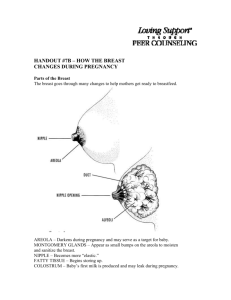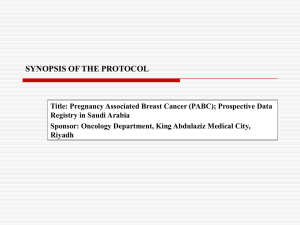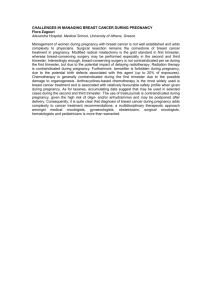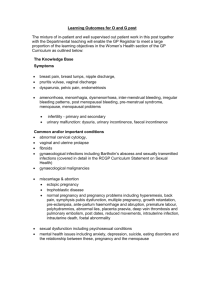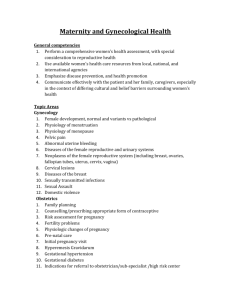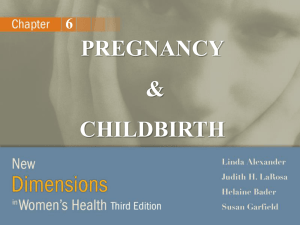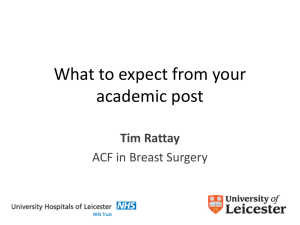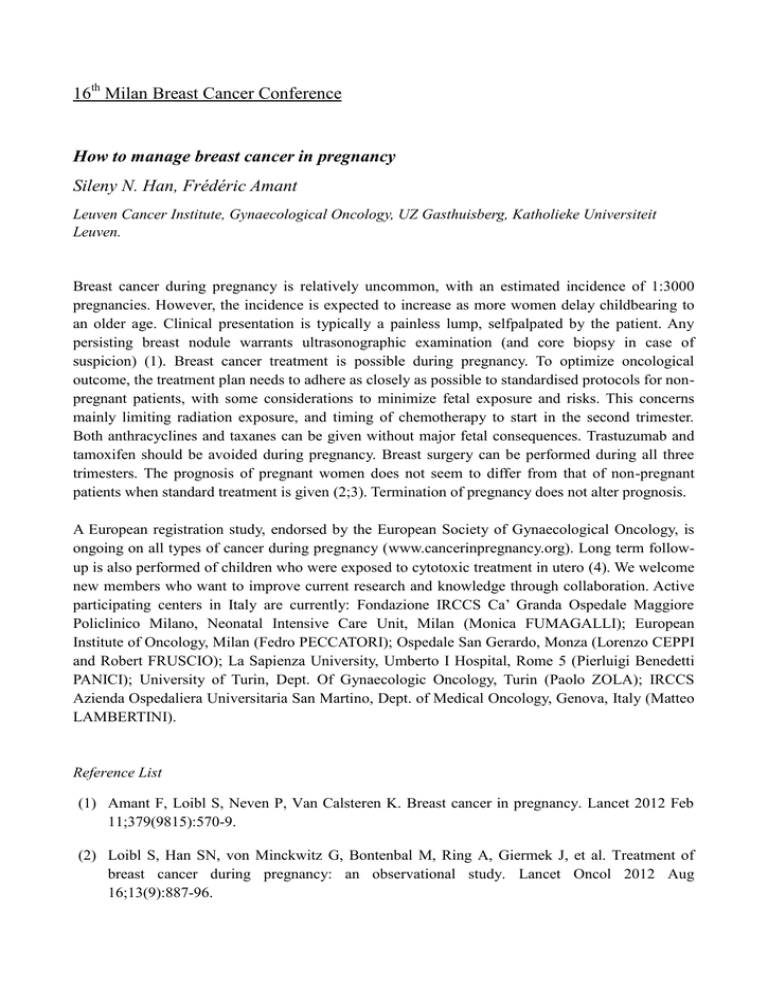
16th Milan Breast Cancer Conference
How to manage breast cancer in pregnancy
Sileny N. Han, Frédéric Amant
Leuven Cancer Institute, Gynaecological Oncology, UZ Gasthuisberg, Katholieke Universiteit
Leuven.
Breast cancer during pregnancy is relatively uncommon, with an estimated incidence of 1:3000
pregnancies. However, the incidence is expected to increase as more women delay childbearing to
an older age. Clinical presentation is typically a painless lump, selfpalpated by the patient. Any
persisting breast nodule warrants ultrasonographic examination (and core biopsy in case of
suspicion) (1). Breast cancer treatment is possible during pregnancy. To optimize oncological
outcome, the treatment plan needs to adhere as closely as possible to standardised protocols for nonpregnant patients, with some considerations to minimize fetal exposure and risks. This concerns
mainly limiting radiation exposure, and timing of chemotherapy to start in the second trimester.
Both anthracyclines and taxanes can be given without major fetal consequences. Trastuzumab and
tamoxifen should be avoided during pregnancy. Breast surgery can be performed during all three
trimesters. The prognosis of pregnant women does not seem to differ from that of non-pregnant
patients when standard treatment is given (2;3). Termination of pregnancy does not alter prognosis.
A European registration study, endorsed by the European Society of Gynaecological Oncology, is
ongoing on all types of cancer during pregnancy (www.cancerinpregnancy.org). Long term followup is also performed of children who were exposed to cytotoxic treatment in utero (4). We welcome
new members who want to improve current research and knowledge through collaboration. Active
participating centers in Italy are currently: Fondazione IRCCS Ca’ Granda Ospedale Maggiore
Policlinico Milano, Neonatal Intensive Care Unit, Milan (Monica FUMAGALLI); European
Institute of Oncology, Milan (Fedro PECCATORI); Ospedale San Gerardo, Monza (Lorenzo CEPPI
and Robert FRUSCIO); La Sapienza University, Umberto I Hospital, Rome 5 (Pierluigi Benedetti
PANICI); University of Turin, Dept. Of Gynaecologic Oncology, Turin (Paolo ZOLA); IRCCS
Azienda Ospedaliera Universitaria San Martino, Dept. of Medical Oncology, Genova, Italy (Matteo
LAMBERTINI).
Reference List
(1) Amant F, Loibl S, Neven P, Van Calsteren K. Breast cancer in pregnancy. Lancet 2012 Feb
11;379(9815):570-9.
(2) Loibl S, Han SN, von Minckwitz G, Bontenbal M, Ring A, Giermek J, et al. Treatment of
breast cancer during pregnancy: an observational study. Lancet Oncol 2012 Aug
16;13(9):887-96.
(3) Amant F, von Minckwitz G, Han SN, Bontenbal M, Ring AE, Giermek J, et al. Prognosis of
women with primary breast cancer diagnosed during pregnancy: results from an international
collaborative study. J Clin Oncol 2013 Jul 10;31(20):2532-9.
(4) Amant F, Van Calsteren K, Halaska MJ, Gziri MM, Hui W, Lagae L, et al. Long-term
cognitive and cardiac outcomes after prenatal exposure to chemotherapy in children aged 18
months or older: an observational study. Lancet Oncol 2012 Mar;13(3):256-64.

